Austen Henry Layard Collection (10 vols.)
Digital Logos Edition
Overview
After acquiring a taste for travel and art in his youth, Austen Henry Layard quickly found his calling as a traveler and archaeologist. His wanderlust drew him from London toward Asia, and he spent a great deal of time exploring Jerusalem, Persia, and Mesopotamia. His curiosity was piqued by the ruins of Nimrud on the Tigris and the great mound of Kuyunjik near Mosul, and he began his own excavations shortly after seeing those monuments. His groundbreaking work uncovered sites in Nineveh, Babylon, and Assyria, greatly increasing our knowledge of Mesopotamian civilizations through the recovery of cuneiform tablets that detailed Assyrian and Babylonian culture and history. Layard’s extraordinary contributions to biblical archaeology changed the face of biblical research and scholarship.
With the Logos Bible Software edition of the Austen Henry Layard Collection, you’ll get instant access to Layard’s discoveries and insights. Key concepts and ideas integrate with your digital encyclopedias, dictionaries, commentaries, and interactive maps, making this collection powerful and easy to access—a rich guide to the ancient world.

Key Features
- Accounts of Layard’s travels through Mesopotamia
- Collections of cuneiform character inscriptions from Assyria
- Layard’s autobiography
Individual Titles
- A Popular Account of Discoveries at Nineveh by Austen Henry Layard
- The Monuments of Nineveh by Austen Henry Layard
- A Second Series of the Monuments of Nineveh by Austen Henry Layard
- Nineveh and Babylon: A Narrative of a Second Expedition to Assyria by Austen Henry Layard
- Inscriptions in the Cuneiform Character from Assyrian monuments by Austen Henry Layard
- The Nineveh Court in the Crystal Palace by Austen Henry Layard
- Early Adventures in Persia, Susiana, and Babylonia, vol. 1, by Austen Henry Layard
- Early Adventures in Persia, Susiana, and Babylonia, vol. 2, by Austen Henry Layard
- Sir A. Henry Layard: Autobiography and Letters from His Childhood until His Appointment as H.M. Ambassador at Madrid, vol. 1, by Austen Henry Layard
- Sir A. Henry Layard: Autobiography and Letters from His Childhood until His Appointment as H.M. Ambassador at Madrid, vol. 2, by Austen Henry Layard
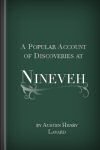
A Popular Account of Discoveries at Nineveh offers an abridged version of Layard’s research and findings originally presented in Nineveh and Its Remains. It details his journey through Assyrian lands, his encounters with desert tribes, and his archaeological work and findings. This volume includes woodcut illustrations and an index.
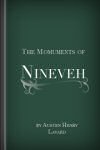
Hand-drawn sketches by Layard grace the pages of The Monuments of Nineveh, providing an intricate look at sculptures, bas reliefs, and other findings from the Nineveh archaeological site. Artwork from multiple periods is reproduced in this volume, offering a rare glimpse into early Mesopotamian culture. Each of Layard’s plates, drawn on the spot at the dig site, is accompanied by a description that details its physical characteristics as well as speculations and insights on the work’s meaning and significance.
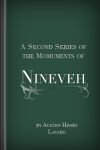
A continuation of The Monuments of Nineveh. Layard provides hand-drawn sketches of bas-relief art, sculptures, and Assyrian architecture. This work offers descriptions and valuable historical information about each piece.
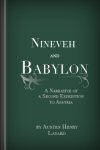
This volume chronicles Layard’s expeditions in Assyria from 1849 to 1851. An abridged version of his popular work, Nineveh and Babylon, it recounts the discoveries made and obstacles faced during his excavations. This edition contains numerous woodcut illustrations and gives readers a valuable visual explanation of Layard’s discoveries.
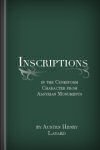
A collection of cuneiform tablet inscriptions, as transcribed by Layard during his travels through Assyria. This volume, a valuable resource for anyone interested in cuneiform writing, includes a table of variants.
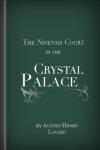
In 705 BC, Sennacherib established Nineveh as the capital of Assyria and built the largest palace of his time. Layard, who carefully examined the Nineveh findings and called in architecture experts from across Europe, reinterprets the Nineveh Court in the Crystal Palace from the discoveries made in his archaeological digs. His work carefully pieces together those findings to, with careful attention to detail, rebuild this piece of architectural history.
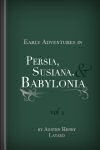
Austen Henry Layard offers an autobiographical account of his early travels through the Near East, expounding on what drew him to excavate the Nineveh and Babylon sites. His work recounts his encounters with various people groups and the discoveries made during his journey. Part one of two.
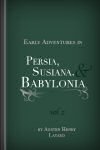
Austen Henry Layard offers an autobiographical account of his early travels through the Near East, expounding on what drew him to excavate the Nineveh and Babylon sites. His work recounts his encounters with various people groups and the discoveries made during his journey. Part two of two.
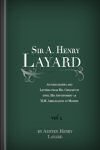
An adventurer at heart, Austen Henry Layard lived life to the fullest. In this two-part autobiography, he regales readers with the summation of his childhood and adolescence leading up to his early expeditions (which can be found in his two-volume Early Adventures in Persia, Susiana, and Babylonia) and his later life in Constantinople. In this two-part edition, Layard goes into great detail, painting an vivid picture of his adventurous life.
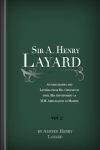
An adventurer at heart, Austen Henry Layard lived life to the fullest. In this two-part autobiography, he regales readers with the summation of his childhood and adolescence leading up to his early expeditions (which can be found in his two-volume Early Adventures in Persia, Susiana, and Babylonia) and his later life in Constantinople. In this two-part edition, Layard goes into great detail, painting a vivid picture of his adventurous life. Part two of two.
Product Details
- Title: Austen Henry Layard Collection
- Volumes: 10
- Pages: 3,150
About Austen Henry Layard
Austen Henry Layard (1817–1894) was born in Paris, but he traveled often in his youth. He was educated in Italy, England, Switzerland, and France. After spending six years working for his uncle’s law firm, he left to travel and explore the Middle East. After his first successful excavations at Kuyunjik and Nimrud, Layard continued his archeological explorations at the ruins of Babylon and the mounds of southern Mesopotamia. (Many of the specimens that he found make up a large part of the British Museum’s collection of Assyrian antiquities.) Layard then returned to England, where he took up a life of politics, serving as under-secretary for foreign affairs and ambassador at Constantinople. Layard retired in Italy, where he continued to write about Italian art and penned the popular account of his earliest travels, Early Adventures in Persia, Susiana, and Babylonia.
Reviews
3 ratings

John L. Jefferson
9/10/2014
AeliusCicero
6/19/2014

Daniel Warner
9/14/2012
This is an excellent set, I can not believe one can get this whole collection for this price. One needs to understand that historians today still refers to this mans work. It is a wealth of historical and archaeological information and the illustrations one will get from this set for teaching purposes is tremendous.